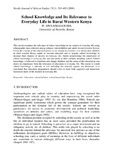| dc.contributor.author | Onyango-Ouma, W | |
| dc.date.accessioned | 2013-06-27T09:18:09Z | |
| dc.date.available | 2013-06-27T09:18:09Z | |
| dc.date.issued | 2006 | |
| dc.identifier.citation | Nordic Journal of African Studies 15(3): 393–405 (2006) | en |
| dc.identifier.uri | http://erepository.uonbi.ac.ke:8080/xmlui/handle/123456789/40971 | |
| dc.description.abstract | This article examines the relevance of school knowledge in the context of everyday life using ethnographic data collected among primary schoolchildren and adults in rural western Kenya. Using the concept of the educated person as an analytical construct, it is shown how children in rural western Kenya aspire to become educated and to acquire school knowledge to increase their chances of success in everyday life. Adults acknowledge the importance of school knowledge in everyday life and take pride in their children attending school. School knowledge is believed to transform and change children and the status of the educated person draws its importance from the relevance of education in everyday life. The extent to which school knowledge is relevant or not, including the relevant aspects are discussed. It is concluded that education programmes should strive to meet both cognitive and immediate functional needs of the learners in everyday life. | en |
| dc.language.iso | en | en |
| dc.subject | Kenya | en |
| dc.subject | school knowledge | en |
| dc.subject | schoolchildren | en |
| dc.subject | Education | en |
| dc.title | School knowledge and its relevance to everyday life in rural Western Kenya | en |
| dc.type | Article | en |
| local.publisher | Institute of African Studies | en |

